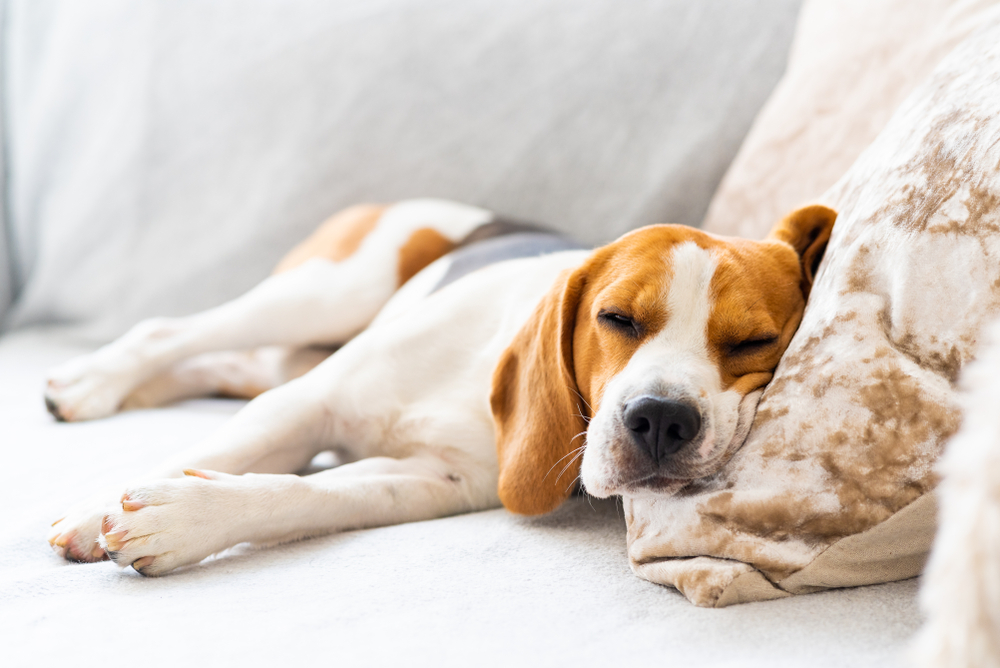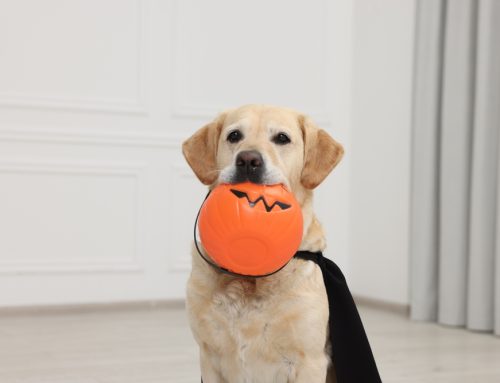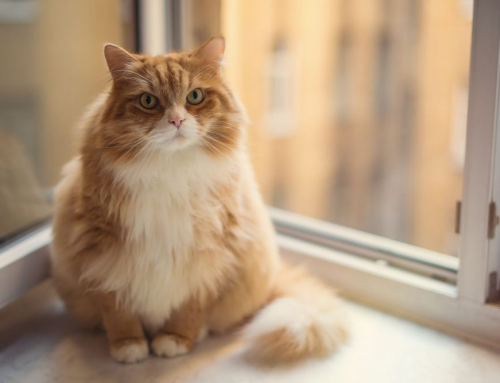As July Fourth rolls around, you may be looking forward to hosting the biggest cookout of the year, lounging in your pool, and gazing at your neighborhood fireworks show. However, your four-legged friend likely doesn’t feel the same way about this sizzling, cacophonous holiday. In fact, a July Fourth celebration can pose serious dangers to your furry pal, especially if you are unprepared for potential hazards. Before the Independence Day festivities start, learn how to keep your pet safe from five of the most common dangers.
#1: Ward off heatstroke by keeping your pet cool and comfortable
Heatstroke can be fatal if an overheated pet is not cooled promptly. Keep a close eye on your furry pal as you enjoy the day outside, and ensure they don’t become too hot. Heat exhaustion can quickly tip over to heatstroke, which can result in organ failure and death. Exercise your pet during the coolest part of the day, which is typically early morning, and play with them indoors during the afternoon and early evening.
When your pet is outside during your July Fourth festivities, monitor them for early heatstroke signs and take action at the first hint of overheating. Heatstroke signs can include:
- Excessive panting
- Thick, ropy drool
- Lethargy
- Dizziness
- Lack of coordination when walking
- Bright red gum and tongue color
- Collapse
- Vomiting
- Diarrhea
- Seizures
- Coma
If your pet begins to pant more heavily than normal, bring them inside and point a fan at their face. Ideally, ensure their temperature remains under 103 degrees. If their temperature does go higher, run cool water over your pet in the bathtub to bring their temperature down.
#2: Practice pool and lake safety when your pet is around water
Nothing beats the heat better than a dip in cool, refreshing water. However, your pet may want to dive in alongside you, but not all dogs know instinctively how to swim. Keep your furry pal out of the deep end unless they can swim unaided, or put them in a safety vest to ensure they keep their head above water.
When swimming with your pet, prevent them from drinking the water, whether from a pool or lake. Chlorine, other chemicals, blue green algae, toxins, and pathogens can all cause serious, if not fatal, illness in your four-legged friend. Instead, bring bottled water and a collapsible bowl to ensure your pet always has fresh water.
#3: Watch out for cookout guests sneaking your pet unsanctioned treats
Guests love to make friends by spoiling other people’s pets. However, kind-hearted visitors can cause unpleasant gastrointestinal (GI) upset or a life-threatening condition by sharing food with your pet. During your July Fourth cookout, ensure your pet does not receive the following treats:
- Grilled meat — Steaks, burgers, hot dogs, and chicken legs are popular at barbecues, especially among the four-legged guests. However, bones and these foods’ high fat content can pose a serious threat to your pet. Keep these foods out of reach to avoid vomiting, diarrhea, or a GI blockage.
- Side dishes — Side dishes, like potato salad, pasta salads, and coleslaw, are generally high in fat, and may also contain toxic ingredients like garlic, onions, and chives. Fresh veggies are the only side items safe for your pet.
- Corn on the cob — Corn on the cob seems like a fun chew toy for your pet, but they can accidentally ingest the cob itself, and need emergency surgical removal.
#4: Keep summertime toxins out of your pet’s reach
The summer season has its fair share of pet toxins, and many make an appearance on July Fourth. Some of the most common poisonous items that can harm your pet include:
- Glow sticks and jewelry — Although the luminescent substance in these products is not highly toxic, excessive drooling and GI irritation can still result.
- Citronella candles and tiki torches — Ingestion of these bug-battling products can irritate the stomach, and may cause nervous system depression. If inhaled, the oils can cause aspiration pneumonia in your pet.
- Sunscreen and insect repellent — Avoid applying any sunscreen or insect repellent product to your pet that is not specifically labeled for animal use. Ingestion of sunscreen products can result in drooling, vomiting, diarrhea, excessive thirst, and lethargy, while DEET-containing insect repellents can cause neurologic problems.
- Matches and lighter fluid — Ingestion of matches can damage blood cells, or cause difficulty breathing, or kidney failure. Lighter fluid can irritate the skin and GI tract, cause nervous system depression, or aspiration pneumonia, depending on your pet’s contact with this toxin.
#5: Secure your pet in a safe spot during a fireworks show

Most pets do not appreciate the ear-splitting, house-shaking booms from fireworks, and many suffer from noise aversion (i.e., a fear of loud noises). To help your pet cope with noise aversion, try the following:
- Create a safe room — Providing a safe retreat for your pet can be greatly comforting, especially when they can curl up in a cozy bed with their favorite toy or treat.
- Apply a compression wrap — A compression wrap applies pressure to calming points on your pet’s body, providing anxiety relief.
- Distract your pet — Distraction with toys, treats, and attention can keep your pet’s mind off the explosive booms overhead.
Pets who still remain anxious despite these management techniques may benefit from anti-anxiety medications and supplements.
Don’t let your furry friend suffer from their fear of loud noises. Take action now to avoid July Fourth-related anxiety by contacting our Town & Country team for help for your pet.







Leave A Comment